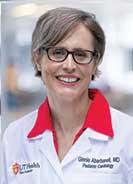Congenital heart defects, CHDs, are the most common type of birth defect, and are present in about 1% of newborns. The term refers to more than a dozen structural irregularities that can affect the way the blood flows through the heart and body.
One of the most common CHDs is an atrial septal defect, often referred to as a hole in the heart. Heart valves, arteries, veins and chambers can also be deformed affecting a baby’s circulation.
About one in four babies with a CHD will need surgery in the first year of life, but the defect can usually be treated successfully if detected early.
Dr. Ginnie Abarbanell, the chair of pediatric cardiology for University Health and UT Health San Antonio, is a vocal advocate for prenatal heart screenings, especially for high-risk babies. Dr. Abarbanell said a study in 2015 found that only 24% of Texas babies with CHDs had prenatal screenings that allowed doctors to prepare for treatment at birth.
"That's one of the lowest rates for prenatal detection of congenital heart disease (in the country)," Dr. Abarbanell said. "There are many factors that are related to that. I think one has to do with the immense size of Texas. Prenatal care varies in different locations. I think that the detection rate is probably getting a little bit better, as our OB (obstetrician) colleagues are setting up different guidelines on how to look at the fetal heart and when to send these moms for further evaluation."
Which mothers and their unborn babies are most in need of prenatal heart screening?
We recommend that moms get a fetal echocardiogram to look at their baby's heart if:
- they had diabetes before they were pregnant
- there is a family history of a heart defect
- the mother had a previous child born with congenital heart disease
There has also been a link between congenital heart disease and IVF (in vitro fertilization).
If the fetal heart cannot be seen well by the OBGYN on your prenatal ultrasound, we would recommend they be screened as well.
If I have one of the risk factors, how should I make sure my baby and I receive the prenatal screening we need for CHD detection and treatment?
Ask your OB, “Do I need to have my baby's heart looked at more closely because of risk factors?” Then, ask your doctor, “Did you see the heart well on the prenatal ultrasound?” If they didn't, then say, “Let’s make sure we do see the heart well, so we can make sure that it looks normal.”
Where does the process begin for a prenatal screening for heart defects?
First, we encourage all moms to get good prenatal care. And our hope is that our OB and our maternal fetal medicine colleagues would pick up on any abnormalities of the fetal heart when they do the prenatal ultrasound.
If there are abnormalities, then we would hope those patients will be sent on to us (pediatric cardiologists) so we can better diagnose what is going on with that baby's heart in order to plan for delivery.
What should parents expect if a prenatal screening detects a heart defect?
Most babies that are diagnosed with congenital heart disease today in the United States have a very good outcome of survival.
About 25% of those children will require heart surgery in the first year of life. Nowadays, we have treatments and surgeries that repair congenital heart defects in a fairly safe process, and we are seeing some of these kids grow up where we didn't before.
I know that if we can catch them early, the outcome is better. That's why prenatal screening is really important to me.




